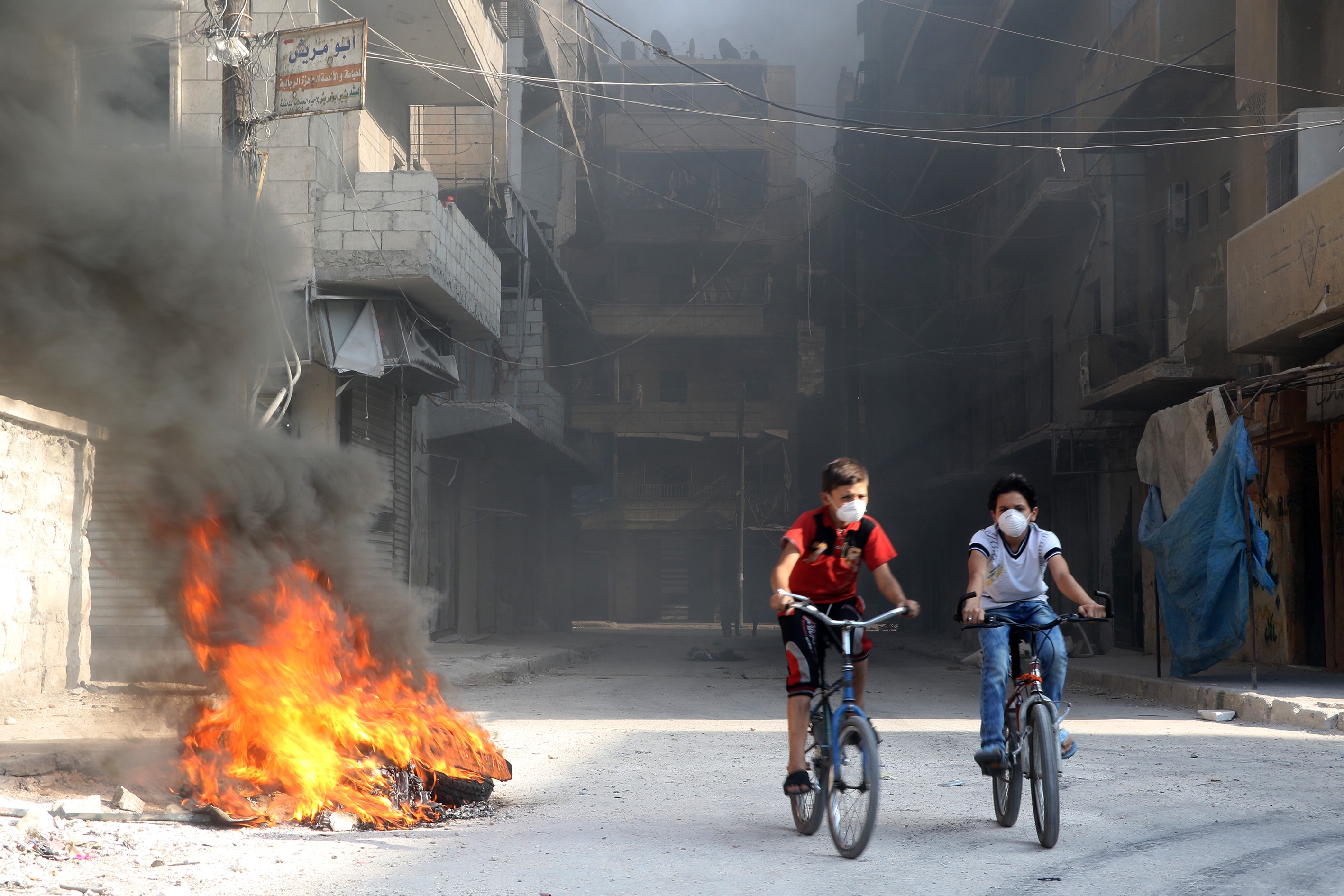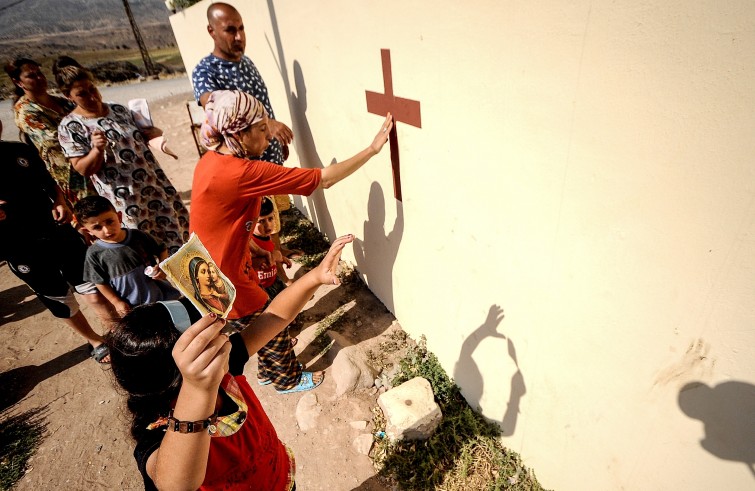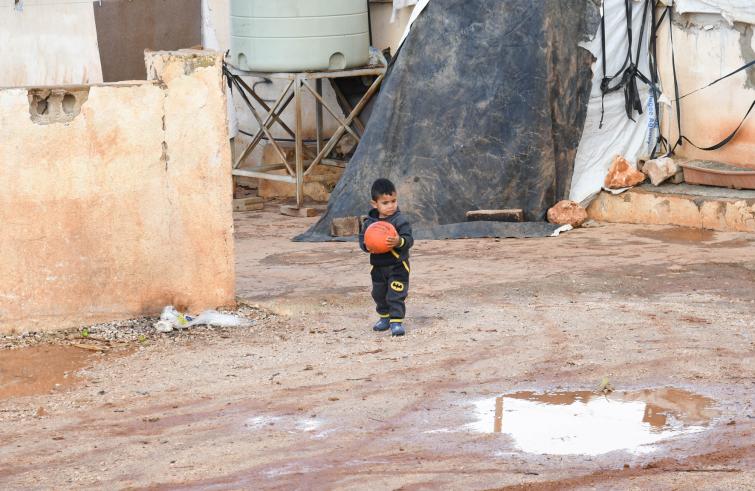War
“Peace be upon you! Christians together for the Middle East”: is the motto of Pope Francis’ visit to Bari for the ecumenical meeting of prayer for peace due to take place next July 7. In the city that preserves the relics of St. Nicholas, the Pope and the heads of Churches and Christian communities of the Middle East will reflect and pray on the tragic situation in the Middle East that “afflicts so many brothers and sisters in the faith.” Follows an overview of the major ongoing conflicts and crises in the Middle East

For decades the Middle East has been one of the areas of greatest tension in the world, a veritable battlefield involving the power capacities of regional actors – Israel, Egypt, Iran, Turkey, Saudi Arabia – and of world players such as USA and Russia, coupled by the inaction of international organizations, notably the UN.
 Millions of people forced to leave their homes as a result of political instability, violence and bombings to seek refuge elsewhere or even abroad, mostly in Lebanon, Jordan and Turkey, are paying the heaviest price. It’s the largest humanitarian crisis since the end of the Second World War, that sees local Christian Churches in the forefront of providing assistance and hospitality to refugees, including many Christians fleeing Syria and Iraq, victims of the cruelty of war, of the religious persecution of the Islamic State , and of political and social discrimination perpetrated by the various governments in office. In these countries the proportion of the Christian minority has dramatically decreased and is now in danger of disappearing altogether.
Millions of people forced to leave their homes as a result of political instability, violence and bombings to seek refuge elsewhere or even abroad, mostly in Lebanon, Jordan and Turkey, are paying the heaviest price. It’s the largest humanitarian crisis since the end of the Second World War, that sees local Christian Churches in the forefront of providing assistance and hospitality to refugees, including many Christians fleeing Syria and Iraq, victims of the cruelty of war, of the religious persecution of the Islamic State , and of political and social discrimination perpetrated by the various governments in office. In these countries the proportion of the Christian minority has dramatically decreased and is now in danger of disappearing altogether.
Syria. The world’s most powerful militaries are fighting on the ground, and the war has entered its eighth year. The regime of President Bashar al Assad, backed by Russia and Iran, is reconquering the areas of the Country still in the hands of opponents and rebel groups. The war caused 500 thousand deaths, twice as many were left injured and mutilated, 27 thousand children were killed. Lowering the black flag of the Islamic State was not enough to cease the gunfire, nor were the UN Resolutions … The diplomatic steps aimed at a political solution to the war are slow and difficult. Christians in the country today amount to less than 2% of the overall population.
 Iraq. The internal crisis that saw the outbreak of war in 2003 escalated with the Syrian conflict, especially after the Islamic State (ISIS) took over large parts of the country, whose expansion began with the occupation of Mosul and of the Nineveh Plains in the spring-summer of 2014. Christian villages were ravaged and their inhabitants, approximately 120 thousand people, were forced to seek refuge in Kurdistan. Also other ethnic minorities were massacred by ISIS such as the Yazidis, with thousands of women abducted and reduced to slavery. As compared to Syria, where a number of players are involved in the conflict, here the government’s efforts, supported by the international community, were focused on eliminating the Islamic State. In this situation, Iraq the Christian minority have suffered a dramatic decline, dropping from 1.5 million before the war to some 300 thousand faithful today. Past May 12 the Country went to the polls, but the political situation is stalled, dwindling between the prospect of recovery and utmost chaos.
Iraq. The internal crisis that saw the outbreak of war in 2003 escalated with the Syrian conflict, especially after the Islamic State (ISIS) took over large parts of the country, whose expansion began with the occupation of Mosul and of the Nineveh Plains in the spring-summer of 2014. Christian villages were ravaged and their inhabitants, approximately 120 thousand people, were forced to seek refuge in Kurdistan. Also other ethnic minorities were massacred by ISIS such as the Yazidis, with thousands of women abducted and reduced to slavery. As compared to Syria, where a number of players are involved in the conflict, here the government’s efforts, supported by the international community, were focused on eliminating the Islamic State. In this situation, Iraq the Christian minority have suffered a dramatic decline, dropping from 1.5 million before the war to some 300 thousand faithful today. Past May 12 the Country went to the polls, but the political situation is stalled, dwindling between the prospect of recovery and utmost chaos.
 Israel-Palestine. Fifty-one years of attempted negotiations, failures and broken dreams. The deadlock grew worse with the recent decision of US president Donald Trump to move the Embassy from Tel Aviv to Jerusalem, that implied a de facto recognition of the Holy City as capital of Israel, amidst clashes between Palestinians and Israeli Defence Forces on the border between Gaza and Israel that left hundreds of Gazawi militants dead and thousands injured. As the attention of the international community shifted to the Syrian, Libyan, and Yemeni crises, to the conflict between Shiites and Sunnis, and among Sunnis themselves (Saudi Arabia and Egypt), the Israeli-Palestinian conflict was given a marginal role. In this context, local Christians, mostly Arab-Palestinians, face a distressing situation and increasing numbers are emigrating abroad in the hope of a better future far from the difficult living conditions imposed by the Israeli military occupation and by social and economic insecurity and political instability resulting from intra-Palestinian tensions between Hamas, which governs the Gaza Strip, and Al Fatah, which controls the West Bank with President Abu Mazen.
Israel-Palestine. Fifty-one years of attempted negotiations, failures and broken dreams. The deadlock grew worse with the recent decision of US president Donald Trump to move the Embassy from Tel Aviv to Jerusalem, that implied a de facto recognition of the Holy City as capital of Israel, amidst clashes between Palestinians and Israeli Defence Forces on the border between Gaza and Israel that left hundreds of Gazawi militants dead and thousands injured. As the attention of the international community shifted to the Syrian, Libyan, and Yemeni crises, to the conflict between Shiites and Sunnis, and among Sunnis themselves (Saudi Arabia and Egypt), the Israeli-Palestinian conflict was given a marginal role. In this context, local Christians, mostly Arab-Palestinians, face a distressing situation and increasing numbers are emigrating abroad in the hope of a better future far from the difficult living conditions imposed by the Israeli military occupation and by social and economic insecurity and political instability resulting from intra-Palestinian tensions between Hamas, which governs the Gaza Strip, and Al Fatah, which controls the West Bank with President Abu Mazen.
Lebanon and Jordan. With Turkey, these two Countries have the highest number of Syrian refugees, including a smaller number of refugees from Iraq. These Countries suffer the heaviest social and economic impact of the wars fought on their bordering zones. The internal balance of the two countries is fragile, especially in Lebanon, that experienced a 20-year-long civil war. Unemployment, healthcare and education systems heavily tried by the inflow of refugees, the shortage of public services, add up to the reasons causing the emigration of the local population which includes Christians, whose numbers are declining, although to a lesser degree compared to other Countries in the region. In Jordan, which enjoys greater stability, street protests broke out over the past weeks over tax increases and cuts in fiscal benefits which led to a dramatic intervention by King Abdullah II to delay the decisions. In recent days, Saudi Arabia, UAE and Kuwait have agreed to allocate $ 2.5 billion over the next five years to support the Jordanian economy.
Egypt. An economic crisis is looming over the Country headed by President Abdel Fatah al Sisi after the International Monetary Fund called for the adoption of austerity policies. The Country’s modernization process launched by al Sisi came at a price. Since 2016 the Egyptian lira lost 50% of its value and the Egyptian population have seen their purchasing power decrease. Public service fees are rising, such as transport, and cuts to state subsidies are penalizing some 70 million people. The Sinai is a focal point of security concerns owing to the presence of active terrorist cells responsible for attacks against security forces and civilians. In order to ensure greater stability and security, critical to revitalizing the tourist sector, a pillar of Egyptian economy, President al-Sisi is placing major efforts on the development of infrastructures, on improving relations with the Coptic Church – whose community represents 10% of the overall population – and with the other Countries in the region, offering to mediate in ongoing conflicts, including between Hamas and Israel.
 Yemen. The war in the Gulf country, one of the poorest in the world, has lasted for more than three years. It involves the Sunni powers of Saudi Arabia and the Arab Emirates on one side and Shiite-led Iran supporting the Houthi rebels on the other. From this perspective the war in Yemen is an extension of the Syrian conflict marked by an open clash between Sunnis and Shiites. It’s a silent war that is fought unnoticed, which left thousands dead and injured, including many children. A veritable humanitarian emergency, which, as denounced by the UN Office for the Coordination of Humanitarian Assistance, puts to risk the life of over 8 million Yemenis as a result of malnutrition. In Yemen there are 4 operating parishes and the Christian community has a been a target of attacks. In December 2015, the Catholic church of the Immaculate Conception in Aden, already bombed by the Saudis, was blown up by Islamic terrorists, and in March 2016 an armed commando killed the nuns of the order of Mother Teresa, in Aden, in a house for the elderly and the disabled run by them. On that occasion Salesian Fr Thomas Uzhunnalil was abducted. He was released 18 months later.
Yemen. The war in the Gulf country, one of the poorest in the world, has lasted for more than three years. It involves the Sunni powers of Saudi Arabia and the Arab Emirates on one side and Shiite-led Iran supporting the Houthi rebels on the other. From this perspective the war in Yemen is an extension of the Syrian conflict marked by an open clash between Sunnis and Shiites. It’s a silent war that is fought unnoticed, which left thousands dead and injured, including many children. A veritable humanitarian emergency, which, as denounced by the UN Office for the Coordination of Humanitarian Assistance, puts to risk the life of over 8 million Yemenis as a result of malnutrition. In Yemen there are 4 operating parishes and the Christian community has a been a target of attacks. In December 2015, the Catholic church of the Immaculate Conception in Aden, already bombed by the Saudis, was blown up by Islamic terrorists, and in March 2016 an armed commando killed the nuns of the order of Mother Teresa, in Aden, in a house for the elderly and the disabled run by them. On that occasion Salesian Fr Thomas Uzhunnalil was abducted. He was released 18 months later.